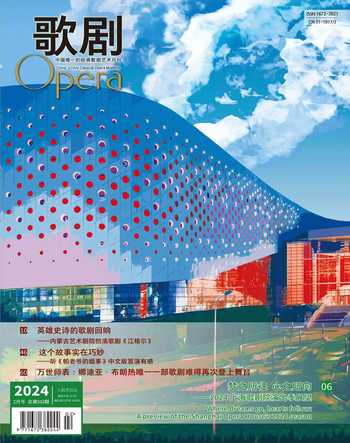语言和音乐
Joanna C.Lee

小瓊:不久前,当我在清理书房里的文件时,发现了我早先的博士论文:30多年前写的长达600页的论文!当时,我是一名专注于研究德国先锋音乐的音乐学学者,我感兴趣的具体研究方向是拓展声乐技术。
小薇:哇!以前从未听你提起过这些。人类的声音确实非常灵活,可塑性很强。它可以通过多种方式拉伸和弯曲;它显然比任何乐器都多才多艺。
小琼:想想当代作曲家使用的微分音。但我想谈的是歌手学习不同语言的能力。试想下,美国人用捷克语唱歌,日本人用法语唱歌,德国人用中文唱歌……语言是可以学习和精通的。只要歌手或演讲者熟练掌握某种语言,他们就可以用它做任何事情。
小薇:你还没有说你论文的细节。你关注的是哪位作曲家和哪些作品?
小琼:我研究了两部最初为音乐会舞台构思的作品,但后来它们作为戏剧场景(在歌剧舞台上,甚至作为电视电影)延长了艺术生命。匈牙利出生的作曲家捷尔吉·利盖蒂(1923—2006)于1962年受北德电台委托创作了《历险》。1966年,他为广播电台的同一当代音乐系列创作了续集《新历险》,取得了巨大成功。
小薇:我在网上看到,这两部作品是为一个室内乐团和三位独唱歌手(花腔女高音、女低音和男中音)谱写的。他们演唱时所用的“语言”真的很有趣。这是利盖蒂自己发明的一种虚构语言——作曲家在乐谱上标注出的是国际音标(IPA)的符号。
小琼:事实上,无论听众是否接触过某种特定的语言,都能够通过表达或诠释的方法来进行交流。对于那些不熟悉国际音标的人来说,它或多或少是一种发音的记忆系统,在任何英语字典中都可以找到音标。这确实是一种专业的语言学习方式。我还记得几年前,我参加了一个由中国女中音梁宁教授开设的大学课程,她让所有的声乐学生学习国际音标。她的目标是让学生们能流利地使用国际音标,这样他们就可以在总谱上添加自己的备注作为发音指南。
小薇:幸运的学生们!下次我查字典的时候,我也会特别注意那些国际音标!

Joan: Not long ago, while cleaning my files in the study, I found my old PhD dissertation: 600 pages I wrote more than three decades ago! Back then, I was a musicological scholar focusing on the German avant-garde and the specific topic that interested me was extended vocal technique.
Valery: Wow! Ive never heard you talk about this before. The human voice is indeed very flexible and malleable. It can be bent and stretched in so many ways; its clearly more versatile than any musical instrument.
Joan: Think of the microtones used by contemporary composers. But what I want to talk about is how well singers can learn different languages. Think of an American singing in Czech, a Japanese singing in French, a German singing in Chinese. Languages can be learned and perfected. As long as the singers or speakers master diction, they can do anything.
Valery: You havent told me about the details of your dissertation. Which composer did you focus on? And which compositions?
Joan: Well, I studied two works that were first conceived for the concert stage, but then extended their lives as dramatic scenarios (on the operatic stage, even as television film). The Hungarian-born composer Gy?rgy Ligeti (1923–2006) wrote Aventures, commissioned by the North German Radio, in 1962. It was such a success he wrote a sequel, Nouvelles Aventures, for the same radio contemporary music series in 1966.
Valery: I read online that these two works are scored for a chamber ensemble and three solo singers (coloratura soprano, alto, baritone). The “language” they sing is really interesting. Its a made-up language invented by Ligeti himself—what the composer noted on the musical score are symbols of the International Phonetic Alphabet (IPA).
Joan: Indeed, expression and meaning can be communicated whether or not the listener understands a specific language. For those unfamiliar with the IPA, its more or less a notation system for pronunciation, which they print with each word in a dictionary. Its truly a professional way of learning diction. I still remember years ago attending a university class taught by Chinese mezzo-soprano Liang Ning, who was making all of her vocal students learn IPA. Her goal was for them to be fluent in IPA, so they can add their own markings to the score as a pronunciation guide.
Valery: Lucky students! Next time I consult a dictionary, Ill look for the IPAs!

